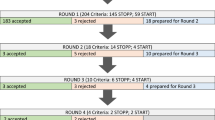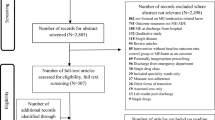Abstract
Generic (i.e. non-branded medicine) and therapeutic (i.e. a less expensive drug from the same class) substitution of medication provides considerable financial savings, but may negatively impact on patients. We report secondary qualitative/quantitative analysis of stroke survivors from a pilot randomised controlled brief intervention to increase adherence to medication. Patients’ experiences of medication changes were examined in conjunction with electronically-recorded medication adherence. Twenty-eight patients reported frequent medication changes (e.g. size/shape/colour/packaging) and two-thirds of these reported negative effects, resulting in, at least, confusion and, at worst, mistakes in medication-taking. Patients reporting a direct effect on their medication-taking (n = 6) demonstrated poorer objectively-measured adherence (i.e. % doses taken on schedule) than those reporting confusion [mean difference = 19.9, 95 % CI (2.0, 37.8)] or no problems [mean difference = 20.6, 95 % CI (1.6, 40.0)]. Changes to medication resulting from switching between generic brands can be associated with notable problems, including poorer medication adherence, for a significant minority.

Similar content being viewed by others
Notes
A third patient reported spending the night in the hospital after accidentally over-dosing due to confusing different tablet strengths after his GP changed his warfarin dosage (but not a brand switch):“When I was on… I think I had five 1[mg]s. I only had 5 and 1 s, and the dosage went down I think from 5[mg] to 4. And I took four 5 mg pills instead of four singles. So I overdosed 5 times… I spent a night in the infirmary.” (Male, aged 67).
References
Bailey, J. E., Wan, J. Y., Tang, J., Ghani, M. A., & Cushman, W. C. (2010). Antihypertensive medication adherence, ambulatory visits, and risk of stroke and death. Journal of General Intern Medicine, 25, 495–503.
Braun, V., & Clarke, V. (2006). Using thematic analysis in psychology. Qualitative Research in Psychology, 3, 77–101.
Briesacher, B. A., Andrade, S. E., Fouayzi, H., & Chan, K. A. (2009). Medication adherence and the use of generic drug therapies. American Journal of Managed Care, 15, 450–456.
Brown, I., Sheeran, P., & Reuber, M. (2009). Randomized controlled trial of an implementation intention intervention to enhance adherence with antiepileptic drug treatment. Epilepsy & Behavior, 16, 634–639.
Bushnell, C. D., Zimmer, L. O., Pan, W., Olson, D. M., Zhao, X., Meteleve, T., et al. (2010). Persistence with stroke prevention medications 3 months after hospitalization. Archives of Neurology, 67, 1456–1463.
Chambers, J. A., O’Carroll, R. E., Hamilton, B., Whittaker, J., Johnston, M., Sudlow, C., et al. (2011). Adherence to medication in stroke survivors: A qualitative comparison of high and low adherers. British Journal of Health Psychology, 16, 592–609.
Duerden, M. G., & Hughes, D. A. (2010). Generic and therapeutic substitutions in the UK: Are they a good thing? British Journal of Clinical Pharmacology, 70, 335–341.
Federman, A. D., Halm, E. A., Zhu, C., Hochman, T., & Siu, A. L. (2006). Association of income and prescription drug coverage with generic medication use among older adults with hypertension. American Journal of Managed Care, 12, 611–618.
Ferner, R., Lenney, W., & Marriott, J. (2010). Controversy over generic substitution. British Medical Journal, 340, 1341–1343.
Field, A. (2009). Discovering statistics using SPSS. London: Sage.
Fischer, B., Lehrl, S., Weber, E., Gundert-Remy, U., & Fischer, U. (1981). Cerebrovascular insufficiency and compliance with drug therapy. Zeitshift für Gerontologie, 14, 145–152.
Folstein, M. F., Folstein, S. E., & McHugh, P. R. (1975). “Mini-mental state”. A practical method for grading the cognitive state of patients for the clinician. Journal of Psychiatric Research, 12, 189–198.
Greene, J. A. (2011). The art of medicine: The substance of the brand. Lancet, 378, 120–121.
Håkonsen, H., Eilertsen, M., Borge, H., & Toverud, E. L. (2009). Generic substitution: Additional challenge for adherence in hypertensive patients? Current Medical Research and Opinion, 25, 2515–2521.
Health and Social Care Information Centre, Prescribing and Primary Care Services. (2012). Prescriptions dispensed in the community: England, statistics for 2001 to 2011. National Health Service. Downloaded from www.ic.nhs.uk on October 23, 2012.
Heart Protection Study Collaborative Group. (2002). MRC/BHF heart protection study of cholesterol lowering with simvastatin in 20,536 high risk individuals: A randomised placebo-controlled trial. Lancet, 360, 7–22.
Himmel, W., Simmenroth-Nayda, A., Niebling, W., Ledig, T., Jansen, R. D., Kochen, M. M., et al. (2005). What do primary care users think about generic drugs? International Journal of Clinical Pharmacology and Therapeutics, 43, 472–479.
Horne, R. (2004). Measuring adherence: The case for self-report. International Journal of Behavioral Medicine, 11, 75.
Information Services Division Scotland. (2011). Prescribing and medicines: prescription cost analysis financial year-2010/11. Edinburgh: ISD.
Kesselheim, A. S., Misono, A. S., Lee, J. L., Stedman, M. R., Brookhart, A., Choudhry, N. K., et al. (2008). Clinical equivalence of generic and brand-name drugs used in cardiovascular disease: A systematic review and meta-analysis. Journal of the American Medical Association, 300, 2514–2526.
Meyer, D., Leventhal, H., & Gutmann, M. (1985). Common-sense models of illness: The example of hypertension. Health Psychology, 4, 5–135.
MHRA (2013). Press release: MHRA issues precautionary recall of medicines manufactured by Wockhardt Ltd. Downloaded from http://www.mhra.gov.uk/NewsCentre/Pressreleases/CON296424 on September 23, 2013.
National Audit Office. (2009). Prescribing savings in 2008. http://www.nao.org.uk/publications/0809/prescribing_savings_in_2008.aspx. Accessed October 23, 2012.
O’Carroll, R. E., Chambers, J. A., Dennis, M., Sudlow, C., & Johnston, M. (2013). Improving adherence to medication in stroke survivors: A pilot randomised controlled trial. Annals of Behavioral Medicine, 46, 358–368.
O’Carroll, R. E., Dennis, M., Johnston, M., & Sudlow, C. (2010). Improving adherence to medication in stroke survivors (IAMSS): A randomised controlled trial: Study protocol. BMC Neurology, 10, 15.
O’Carroll, R. E., Whittaker, J., Hamilton, B., Johnston, M., Sudlow, C., & Dennis, M. (2011). Predictors of adherence to secondary prevention medication in stroke patients. Annals of Behavioral Medicine, 41, 383–390.
Phillips, B., Roberts, C., Rudolph, A. E., Morant, S., Aziz, F., & O’Regan, C. P. (2007). Switching statins: The impact on patient outcomes. British Journal of Cardiology, 14, 280–285.
Scarborough, P., Peto, V., Bhatnagar, P., Kaur, A., Leal, J., & Luengo-Fernandez, R. (2009). Stroke statistics, 2009 edition. Department of Public Health, University of Oxford. Downloaded from www.heartstats.org on May 30, 2012.
Sudlow, C. (2008). Preventing further vascular events after a stroke or transient ischaemic attack: An update on medical management. Practical Neurology, 8, 141–157.
Toverud, E.-L., Røise, A. K., Hogstad, G., & Wabø, I. (2011). Norwegian patients on generic antihypertensive drugs: A qualitative study of their own experiences. European Journal of Clinical Pharmacology, 67, 33–38.
Trewby, P. N., Reddy, A. V., Trewby, C. S., Ashton, V. J., Brennan, G., & Inglis, J. (2002). Are preventive drugs preventive enough? A study of patients’ expectation of benefit from preventive drugs. Clinical Medicine, 2, 527–533.
Tversky, A., & Kahneman, D. (1973). Availability: A heuristic for judging frequency and probability. Cognitive Psychology, 5, 207–233.
Van Wijk, B. L., Klungel, O. H., Heerdink, E. R., & De Boer, A. (2006). Generic substitution of antihypertensives drugs: How does it affect adherence? Annals of Pharmacotherapy, 40, 15–20.
Warlow, C., van Gijn, J., Dennis, M. S., Wardlaw, J., Bamford, J., Hankey, G., et al. (2008). Stroke: practical management (3rd ed.). Oxford: Blackwell.
Acknowledgments
This project was funded by a grant from the Scottish Government, Department of Health, Chief Scientist Office; reference number CZH/4/569. We would like to thank the doctors and nurses at the Western General Hospital stroke clinic and ward for their help in recruitment, and the patients for giving up their time to take part.
Conflict of interest
There are no conflicts of interest.
Author information
Authors and Affiliations
Corresponding author
Rights and permissions
About this article
Cite this article
Chambers, J.A., O’Carroll, R.E., Dennis, M. et al. “My doctor has changed my pills without telling me”: impact of generic medication switches in stroke survivors. J Behav Med 37, 890–901 (2014). https://doi.org/10.1007/s10865-013-9550-5
Received:
Accepted:
Published:
Issue Date:
DOI: https://doi.org/10.1007/s10865-013-9550-5




